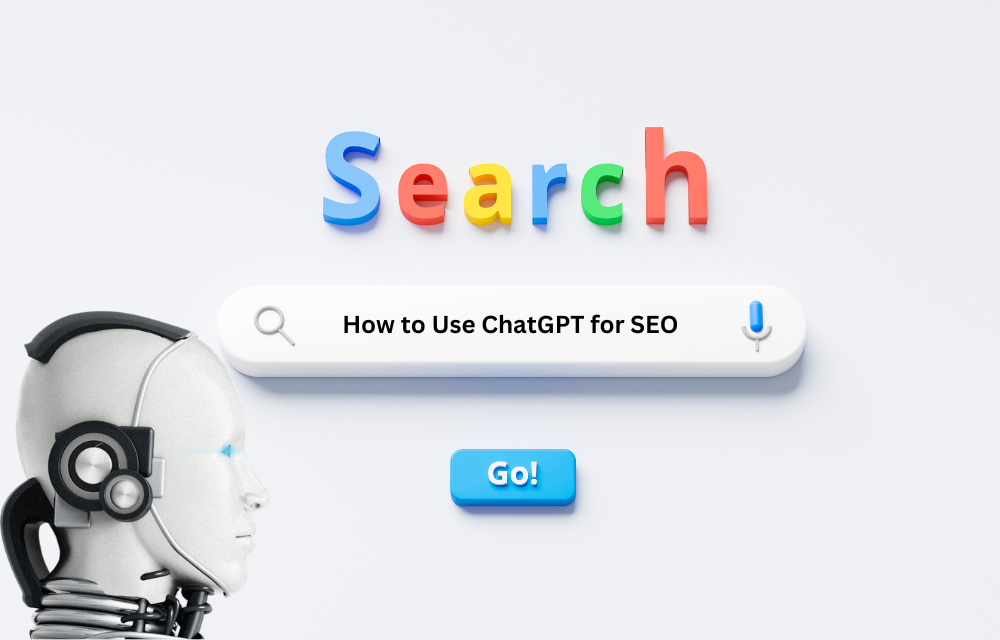ChatGPT for SEO: Can ChatGPT Replace Traditional Content Optimization?
Key Takeaways
- ChatGPT can assist in generating the content, finding keyword variations, and providing insights into user intent.
- However, it still requires human input, fact-checking, and creativity to produce original, authentic, and valuable content that aligns with your readers' needs and preferences. Furthermore, to create valuable content, it's crucial to have a deep understanding of the users' problems, and this understanding should come from the writer or the editor of the article.
As someone who has been writing for websites using SEO principles to boost my Google rankings for a few years, I was thrilled to discover that ChatGPT could help me take my content to the next level.
After seeing numerous tweets about how ChatGPT could help me reach the coveted first-place spot on Google and drive traffic to my site, I eagerly dove in headfirst and began testing various SEO tactics.
However, I quickly learned that this adventure was far from easy.
In this article, I will share my experience with the most popular ChatGPT SEO tactics, including the results I achieved and the valuable lessons I learned along the way.
What are the basic principles for search engine content optimization?

Before delving into how to use ChatGPT for content optimization, let's review the fundamental principles of optimizing your content.
Understanding these principles will enable you to provide specific prompts that ChatGPT can use to generate high-quality results, ultimately boosting your Google ranking.
In addition, it can also help you learn where and how ChatGPT can help you with content optimization and if there are things that are better done manually.
- Relevant and valuable content. Suppose you are familiar with Google's E-E-A-T (Experience, Expertise, Authoritativeness, and Trustworthiness). In that case, you know that your content must be valid, objective, accurate, and written by someone with enough knowledge to serve as a relevant source of information. Unsatisfactory content will result in users leaving your web page to find better content, causing you to lose rankings on Google. Keep in mind that E-E-A-T is not achieved only by content. Website owners also need to provide author bios, links to their social media accounts, emails, and about us page to prove that behind the articles are actual experts.
- Keyword research: Keywords are crucial to every search engine optimization process. Incorporating them naturally into your content "tells" Google that your article or page is relevant to a specific topic. Even better, putting LSI keywords makes it even easier for search engines to determine what your content is about and consequently rank you higher. There are many ways of finding keywords; however, those who have been in the SEO game for a hot minute now know that keyword difficulty and keyword volume are metrics that need to be taken into account when writing content that needs to accumulate traffic by Google.
- Users' Search Intent: Another vital aspect of SEO is user intent. Understanding the user's intent and what they're searching for on Google can help you create content that fulfills their needs, leading to higher rankings. By providing relevant content that aligns with their needs, your website can become a go-to source for information on a specific topic, boosting your search engine rankings and popularity.
- Skimmable content: Skimmable content is a must in web writing. Making your content easy on the eye, digestible, and categorized in intuitive sections with bullet points or other types of formatting that can help the users quickly find and understand the information is another factor that influences whether your content will rank on the first page of the search results.
- Backlinks: When other websites link back to your content, it confirms your authority and signals to Google that your website is a valuable resource on a specific topic. However, acquiring quality backlinks can be challenging, and creating fantastic content is essential to earn them in an ethical way that aligns with Google's standards.
👉 Also Read: Top 11 Best Ways to Make Money with AI
After going through the standards for SEO, we can begin discussing how ChatGPT can help us optimize our content for search engines using the above principles.
Relevant and valuable content
The first step to ranking on the first page on Google is creating relevant and valuable content that demonstrates what Google calls E-E-A-T.
Can ChatGPT help us do that?
ChatGPT has been mostly used for generating texts on different topics, and as reported by many, the results have been astonishing.
When you first look at the text or blog posts created by ChatGPT, it seems well-written, easy to understand, and engaging. It is clear, brief, and coherent, which shows that ChatGPT is proficient in generating language.
And what's most exciting, the text is written in just a few seconds.
However, you need to know the right prompt so ChatGPT can give you the possible results.
Additionally, you need to fact-check the text to ensure the results are up-to-date and correct, especially if you are using the free version of ChatGPT, which has limited information.
Furthermore, Google appreciates originality and authenticity, so you must adapt the article to align with your needs and preferences and prove that you are behind the published piece.
The most popular prompt for ChatGPT and writing content is:
"Can you act as a digital marketing specialist and write me an article for the best Instagram marketing strategies to gain more followers? The article is about beginner users who aim to gain followers on their Instagram accounts. Make sure to inform them about the best time to post, the number of posts that need to be posted, and how they can build an audience organically".
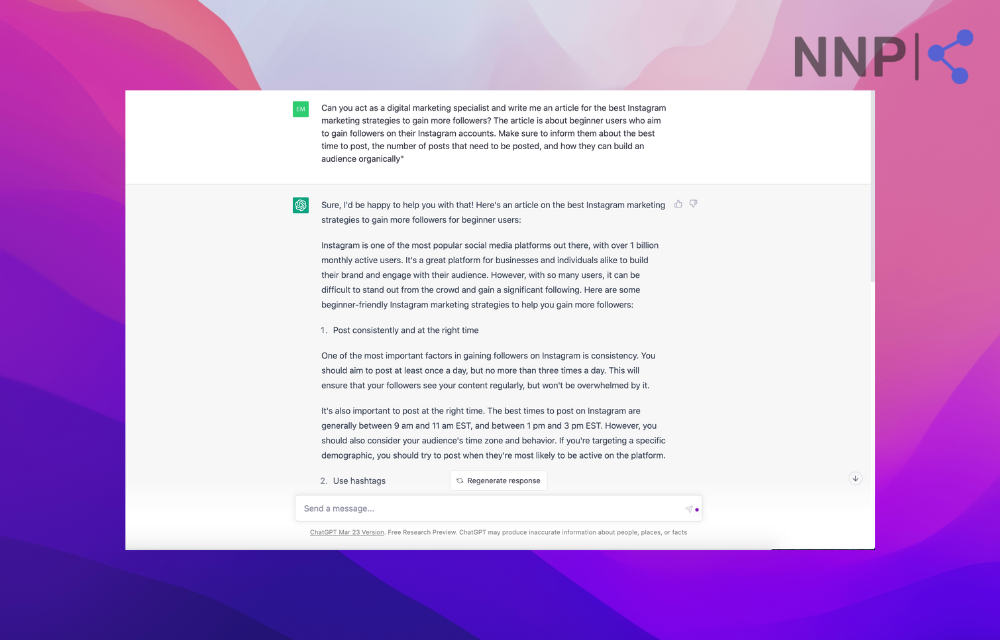
Before giving the prompt and publishing your article, you need to scan your competitors and understand how your article can be better than theirs.
Even if the article is written, you will still need to work to improve it and ensure that it offers your readers unique and valuable information.
Keyword research
Is ChatGPT helpful in finding search terms people use on Google?
And will this be the end of expensive tools for keyword research?
Probably, no, at least for now.
Multiple online techniques explain how ChatGPT can be used for finding keywords.
One of the techniques is giving ChatGPT a simple prompt like:
"Can you give me a list of keyword variations for Instagram marketing Strategies?"
"Give me a list of related keywords for Instagram marketing Strategies."
"How would you search Google if you need to find an article that talks about Instagram marketing strategies?"
"Can you give me a list of LSI keywords for Instagram marketing strategies?"
The results I received were interesting.
- Using the first prompt, I received a list of keywords that don't resemble the user's intent. For example, Instagram Content Creation differs from Instagram Marketing Strategies.
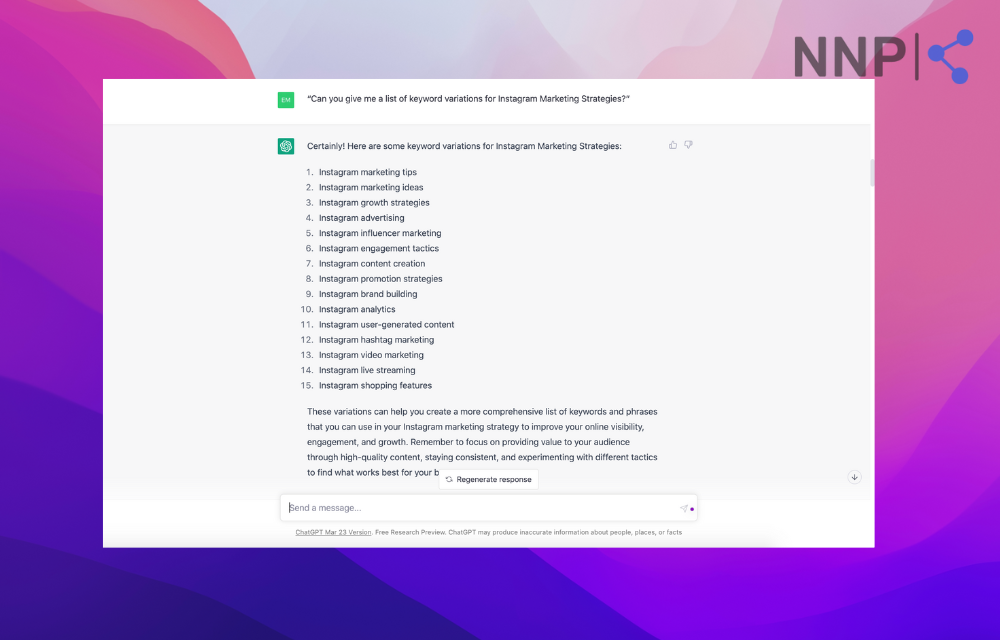
Googling those two terms gives completely different results, meaning that the topic and the intent differ.
- The second prompt should have given me a list of related keywords to Instagram marketing strategies.
Related keywords refer to words or phrases that are closely associated with the primary keywords you are focusing on and attempting to rank for on search engine results pages (SERPs). These terms include synonyms, variants, or semantically related terms that can help search engines understand the context and relevance of your content and improve your search rankings.
Instead, I received a list of keywords that can be placed in my article but are not variants or synonyms of the phrase I am searching for.
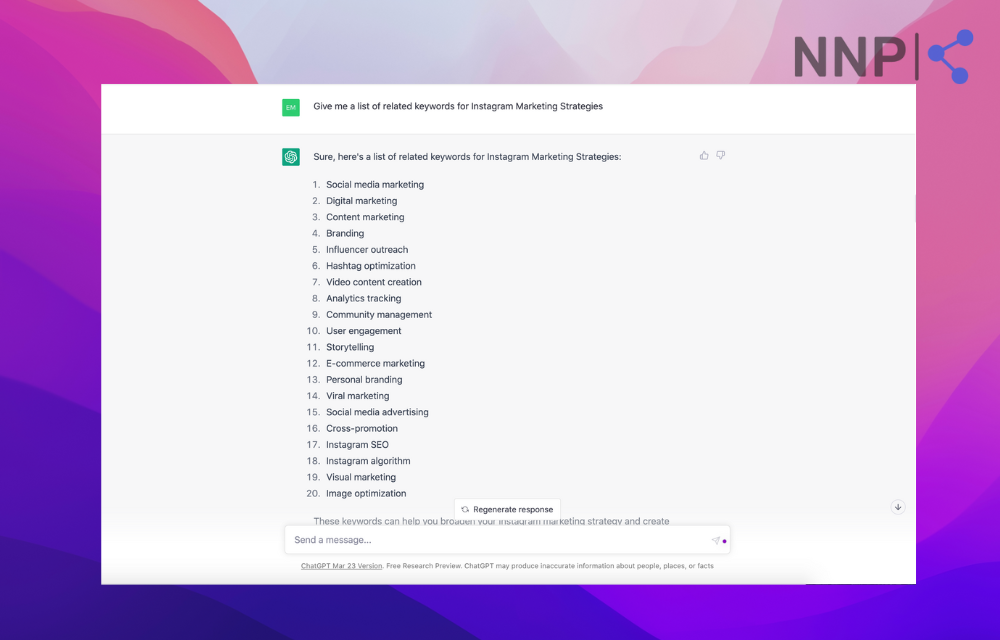
In comparison to SemRush, ChatGPT was way off.
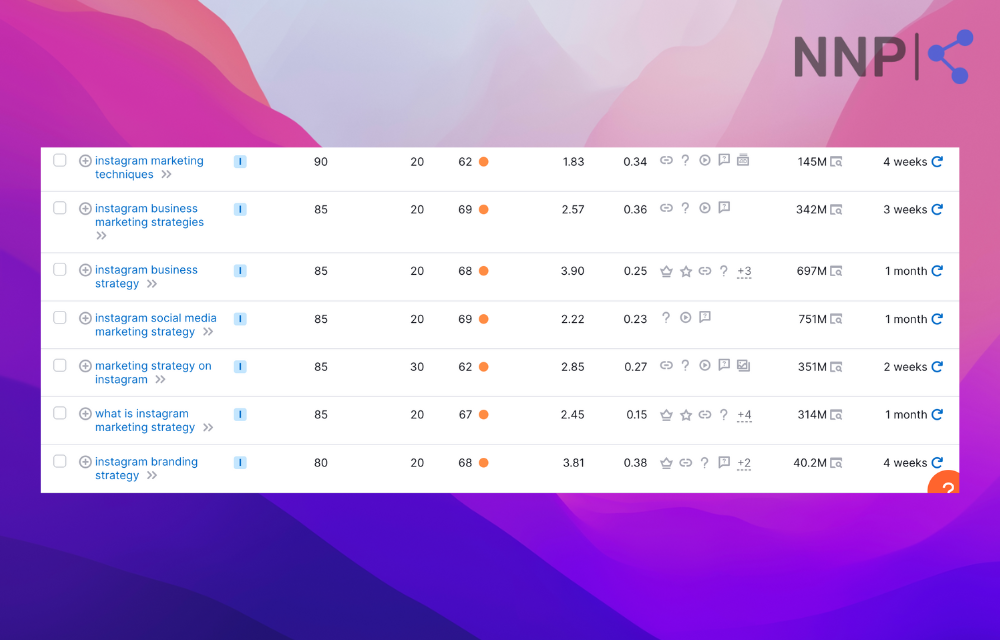
- The third prompt, "How would you search Google if you need to find an article about Instagram marketing strategies?" gave me more relevant results.
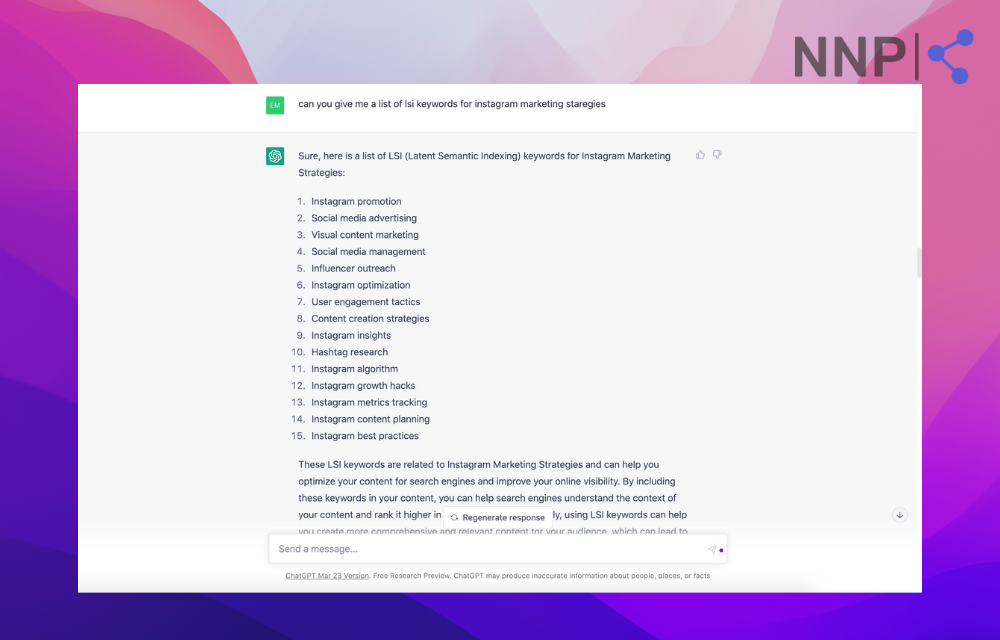
I can see how phrases like "How to grow your Instagram following," "Instagram promotion tactics," "Building a brand on Instagram," "Instagram marketing tips and tricks, "Effective Instagram marketing techniques," and "Instagram marketing for beginners" can be in alignment with someone searching for Instagram marketing strategies.
- The last prompt also gave me a decent list of keywords that can be placed in my article.

Lastly, I asked ChatGPT to provide me with the keyword volume and difficulty of my queries, and I got this message:
"As an AI language model, I do not have access to real-time search volume and keyword difficulty (KD) data. However, I can suggest using keyword research tools such as Ahrefs, SEMrush, or Google Keyword Planner to find estimated search volumes and keyword difficulty scores for the keywords you mentioned".
👉 Bonus Read: 5 Smart Ways to Use ChatGPT
Search Intent
Let's see if ChatGPT can tell me what users are trying to find.
The prompt I used:
"Could you please provide a table that includes the user intent and the corresponding keyword for the following terms? The first column should indicate the user intent, while the second column should list the relevant keyword."
It worked like a charm.
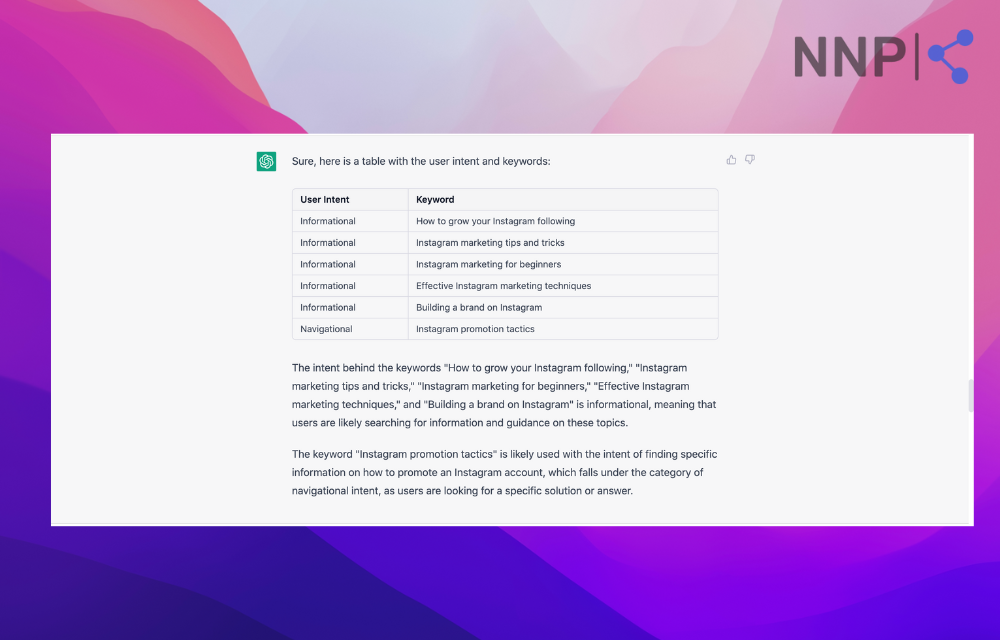
Skimmable content.
ChatGPT can also be used for creating skimmable content.
Simple prompts like "Can you format the sections in bullet points," "Or can you create a comparison table for…" will give you quick results and structure your content quickly.
You can also add commands for bold and italic.
Backlinks
Right from the bat, we know that ChatGPT can't provide us with backlinks.
I asked ChatGPT to generate a list of websites with low domain authority that write about social media tips and tricks, but the AI model couldn't fulfill my request.
Bonus: Meta titles, meta descriptions, and title tags
Chat GPT can also be used for creating meta titles, meta descriptions, and title tags.
You can provide ChatGPT with simple prompts like: "Create meta descriptions for Instagram Marketing Strategies, using this keyword" and receive a few suggestions for meta descriptions within seconds.
In addition, using prompts like: "Can write an attractive SEO title for…" can give you a list of creative titles that are hard to resist.
So, what are the pros and cons of using ChatGPT compared to "traditional" SEO?
- Saves time and money. ChatGPT has proven to be a tool that saves time and money due to its ability to provide full articles on any topic in a matter of seconds. In addition, ChatGPT has a free version, which means you can receive content without breaking the bank.
- Expertise. ChatGPT can provide you with somewhat quality content. The articles that it can generate are well-written, cohesive, and coherent. However, ChatGPT doesn’t always provide true facts and information. Most of the time, the bot is expressing itself eloquently and skillfully, making it hard for the common reader to perceive some of the nonsense it produces.
- Keywords, research, skimmable, content, titles, and meta description. I will stick to the common keyword research tools
What is Google's position on AI-generated content?
Google has long been fighting against content produced with the help of Artificial Intelligence; however, in February 2023, they published Google Search's guidance about AI-generated content, stating that Google will award high-quality content however it is produced.
The guidance advises publishers to consider the "Who, How, and Why" of content creation.
"Who" refers to the content creator; publishers should provide a byline or background information about the author.
"How" refers to the method used to create the content, and it's important to be transparent about the use of automation or AI in the content creation process.
If AI was used, publishers should explain why it was used. This is all part of Google's effort to ensure that the content that appears in search results is high-quality, trustworthy, and written by experts.
In conclusion
While ChatGPT can be a valuable tool for generating content, it can only partially replace traditional content optimization techniques.
SEO principles, such as creating relevant and valuable content, conducting keyword research, understanding user intent, producing skimmable content, and acquiring quality backlinks, are still crucial to achieving high rankings on Google.
ChatGPT can assist in generating the content, finding keyword variations and related keywords, and providing insights into user intent.
However, it still requires human input, fact-checking, and creativity to produce original, authentic, and valuable content that aligns with your readers' needs and preferences.
ChatGPT can complement traditional content optimization techniques but cannot entirely replace them.

